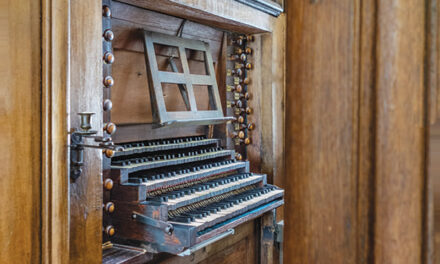Marking its NC premiere, Mike Bartlett’s King Charles III opened this week at Burning Coal Theatre Company. The play, billed as a “future history play,” is written largely in blank verse and modeled on the structure of a Shakespearean history play. It imagines the near future in which Queen Elizabeth II has died and her son, Charles III (Randolph Curtis Rand), is charged with taking up the monarchy. In an increasingly complex and darkening world of politics and parties, the king ultimately must choose between what is right and what is tradition, challenging the very role of the British monarchy itself.
Burning Coal’s unique, intimate thrust stage created certain demands for director Karen O’Brien and set designer Elizabeth Newton, forcing sparse sets that do not obstruct the audience’s view, but still manage to convey everything from Buckingham Palace to a shawarma kebab stand out in the streets of London. Jocelyn Pook’s eclectic music choices, directed by Julie Oliver, serve to recreate the unique mixture of modern culture and traditional ceremony that is London, utilizing pop songs like Lorde’s “Royals,” as well as complex requiem movements during which the cast sometimes sings in impressive four-part harmony.
This production whittles the show down substantially to two-and-a-quarter hours from the original production’s three-hour run time. This allows ample time to utilize striking silhouettes, suspenseful movements with dramatic music, and almost cinematic moments that are emotionally charged. The were some moments where the music was a bit too loud over the dialogue, and the hollow stage platform substantially amplified footsteps, enough to muffle some lines, depending on where the actors were placed, but, in general, the performers handled the thrust stage well. Rand, especially, made great use of his asides and the monologues in sending his performance out to the audience, rather than directing all dialogue at the other characters. This did, occasionally, make it a bit unclear as to whether characters were interacting or thinking aloud, especially in the case of Duchess Catherine (Chloe Oliver), who seemed to do a lot of ruminating while there were many other characters on stage.
The singing and haunting music are aspects of just one element that brought some of the surrealism of the show to life. Whirling lights and sudden audio changes announced the arrival of the ghost of Princess Diana (Elise Kimple), who haunts Charles (Rand) and William (Lucius Robinson), but also metaphorically looms large in her absence. The Ghost is evocative of an Ophelia or King Hamlet character, underscoring some of the influence Bartlett has drawn from Shakespeare, though it was humorously jarring to be thrown from the dignified throne room to the dubstep club where Prince Harry (Ben Apple) was flirting with Jess (Mya Ison) in iambic pentameter.
The blank verse did, unfortunately, cause a few minor issues in dialogue delivery: Rand and Joey Infinito, who plays Prime Minister Mr. Evans, both had a few fumbles with the clunky phrases, but managed to recover fairly well. Charles, William, and Charles’ wife, Camilla, the Duchess of Cornwall (Lilly Nelson), all drove to the extremes of emotional expression, conveying just how emotionally fraught this time was for all of the royal family. Apple and Ison also played a delightfully honest look at the young, wishful relationship forbidden to a prince. Ison, a senior at Enloe High School, was striking, sharp, and earnest as Jess.
The unusual mixture of hyper-realistic and surreal fantasy was at times humorous, perhaps more than intended, but was done well. There were sound effects to heighten the reality of certain situations, like press chatter, heckling during a Parliament meeting, and club noise. There were fantastical elements like masks, candles, and fourth-wall-breaking to unsettle the audience at times when it felt like the family was on the verge of collapse. I suggest reading up a little on the royal family in the past few decades and reviewing how British politics work, as the first act was slightly confusing for a non-Anglophile like myself. That said, the actors made it easy to feel emotionally invested in the story, especially Rand and Robinson, strong male leads whose characters constantly wrestle with duty, family, and ethics.
King Charles III is not too far off the mark on current politics, and may only be topical and relatable for the next decade or so, but it provides an enthralling look into the possibilities of the future of an ancient tradition of monarchy. At times it feels like Hamlet or Downton Abbey, while at others it’s more like reading the current news. The play is incredibly interesting and performed beautifully by some of the most talented actors in the area. The actors who’ve had experience with Shakespeare really shone and delivered stunning performances. Through the iambic pentameter and Shakespearean structure, the show remains accessible for modern audiences interested in pondering the near future.
King Charles III continues through Sunday, April 29. For more details on this production, please view the sidebar.











